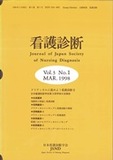Japanese
English
- 有料閲覧
- Abstract 文献概要
- 参考文献 Reference
わが国における妥当な看護診断の確立に向け,現在最もよく使用されているNANDA看護診断ラベルの適切性の是非と適切ではない理由を質問紙を用いて調査した.その結果,対象の95%以上が「適切である」と回答した“適切性の高い看護診断ラベル”は〈下痢〉,〈睡眠パターンの変調〉,〈便秘〉,〈不安〉,〈嚥下障害〉,〈言語的コミュニケーションの障害〉,〈排泄セルフケアの不足〉,〈入浴/清潔セルフケアの不足〉であった.一方,「適切である」と回答したものが50%未満の“適切性の低い看護診断ラベル”は〈半側空間無視〉,〈精神生活の苦悩〉,〈レイプ-トラウマシンドローム:複合反応,沈黙反応〉であった.適切性の高い診断ラベルは原因と結果(症状)がはっきりしているもの,看護介入が行いやすい,用語が従来から看護実践で使用されていたものであることがわかった.反対に,適切性の低い診断ラベルの特徴は,看護用語としてなじみの薄いものであり,看護介入が難しいといった問題に加えて,日本の文化あるいは社会状況に影響を受けていることが明らかになった.また,おのおのの看護診断ラベルについて適切でない理由として得られた1,639件の意見は,①診断ラベルの不適切な表現,②別の診断ラベルでカバーできる,③定義に問題がある,④診断をするのが難しい,⑤共同問題としてとらえる,⑥使用頻度が少ない,⑦北米との文化的な違い,⑧その診断に対する看護介入がわからないの8カテゴリーに分類できた.以上の結果から,今後妥当性検討や概念分析を行う際には,日本の文化や社会状況あるいは語源的な特徴について考慮する必要性が示唆された.
The purpose of this study is to investigate the relevancy for NANDA's Nursing Diagnoses, and the problems of using them. The sample consisted of 380 nurses who had experience using nursing diagnosis. The relevancy of 109 NANDA's Nursing Diagnoses were evaluated. The results were as follows: 1. Nursing diagnoses that over 95%of subjects reported “relevant”were diarrhea, sleep-pattern disturbance, constipation, anxiety, impaired swallowing, impaired verbal communication, toileting self-care deficit, bathing/hygiene self-care deficit; 2. Nursing diagnoses that below 50%of subjects reported “relevant”were unilateral neglect, spiritual distress, rape-trauma syndrome: compound reaction, rape-trauma syndrome: silent reaction; 3. 1,639 open-ended comments regarding lowest relevancy using NANDA's Nursing Diagnoses were classified into 8 categories. (1) The translation to Japanese was unsuitable. (2) The diagnoses could be covered by another one. (3) Nurses could not understand the definition of the diagnoses. (4) Nurses felt difficulties to diagnose. (5) Nurses regarded the diagnoses as collaborative problems. (6) The diagnoses were rarely used in nursing practice. (7) There was cultural gap between North America and Japan. (8) Nurses could not find nursing intervention for the diagnoses. These findings suggest that it is needed that development of nursing diagnoses.
Copyright © 1998, Japan Society of Nursing Diagnosis. All rights reserved.


